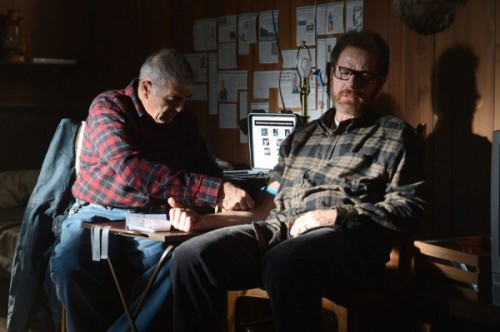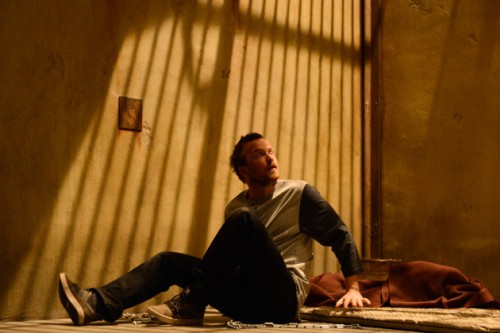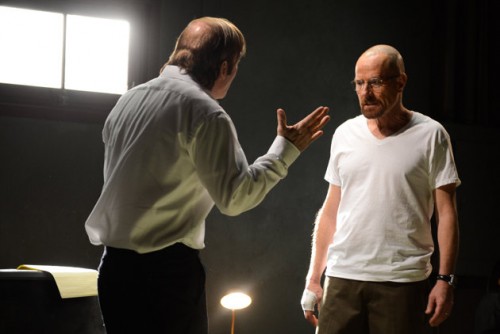
Again, if you haven’t watched “Granite State,” Breaking Bad’s most recent episode, wait to read this! Spoilers abound.
If last week’s episode was the spelling out of the end, the unveiling of all lies, this week’s episode did two things to show what will endure in the wake of the truth.
The first, of course, is the utter isolation that surrounds nearly every character in Walt’s world. Skyler is alone to face legal prosecution. Marie is now husbandless, in a car with DEA agents. Saul is headed to Nebraska. Junior answers the phone, alone, in his school’s counseling office. Brock is now without his Andrea. Both Jesse and Walt begin this week’s episode, the penultimate episode of the Heisbenberg drug empire, underground, one in indentured servitude, one in the basement of a vacuum repair center, about to become a “Mr. Lambert” of New Hampshire. This is the all-permeating hell of Walt’s way of lies: the individuating damnation of them all.
It can be argued that, in some shape or form, many of these characters have reaped the reward of some participating association with Heisenberg’s empire. It can be said that “sin” in some elemental sense, demands cost, as it is portrayed in this episode. On top of this, though, there is a strange and complex moral addendum to this theory for the world of Breaking Bad: it does not limit “bad” coming only within the bounds of Walt’s associates so much as it permeates the air of the greater Albuquerque area (and on). In other words, “guilty by association” is less apt than “infected by outbreak.” While Saul Goodman, Walt’s legal associate, is off to a new identity in Nebraska, Andrea—who never knew Jesse’s business, and never asked—is dead. And so, really, is Marie.
This theory continues to be supported by Jesse. Arguably the guiltiest (by association), we could not bear the gun to his head last week. We root for Jesse, not as a punishable offender, but as a boy infected. As we watch him unlatch Uncle Jack’s underground cage, clambering from the bars, we are given an image to go along with the way we’ve always seen him: poor Jesse, why can’t you get out? Regardless of his fleeting senses of freedom, we see the boy who cares too much, used again as a tool.
The second enduring trait is Walt’s insatiable vanity. Even in a secluded safehouse, with terminal cancer, with no available contact, he cannot “wait it out” with his pride. Professional Eraser Ed has created a new start for Walt, a seamlessly protected way not to be found out. All he must do is stay, and stay quiet. But even as Ed leaves the first time, Walt walks to the edge of his new boundaries. He still has “business” to take care of. He must not have failed, and so he cannot have disappeared.
One of the more heavy-handed moments of the episode comes between Saul and Walt before leaving Albuquerque. Saul, always Walt’s man of penalty-evasive decision making, has always offered the trump card to Walt, and now Walt has taken it. He will “disappear,” but now Saul offers the trump card behind the trump card: face the music. He tells Walt that Skyler has nothing to barter in court if Walt disappears. His family will erode because of this. There will be no one to give money to. If he turns himself in, with dignity, he becomes the “John Dillinger of the Metropolitan Detention Center.” Walt cannot do this, though. Why? He “still has business to take care of.” What kind of business? Getting his money back. Why? Because his money is his due—the money Ensures (ahem…) the costs were never in vain, but justified.
[Aside: Surrender has always been and must always be a viable option for Gilligan’s narrative universe. If Walt cannot surrender and admit his guilt, his pride has no foil. His demise only makes tragic sense if he chooses not to relent. And as we reach the culmination of his demise, we see these moments in grotesque, that even in death’s grip, in a snowy room alone, he puts on the Heisenberg hat.]
This episode wants to say that it is more than money, but has always been about credit. The Heisenberg brand “Blue,” just like Gray Matter, is a brand, a non-being through which Walter White can project the power he has always believed he had. Both are names, to be picked up by anyone wanting to “make a name for themselves” (Gen 11), and now we see the connection. Both entities—the Blue and the Gray Matter—have grown bigger than him, and have been taken from him. He rages from the New Hampshire barroom, not to the son who has repudiated him—I believe back to Albuquerque—to the credit he believes is owed him. (Interesting, that the fame he always wanted he’s finally gotten but cannot see, with no TV and no New Hampshire neighbors.) He needs his Empire back.
But Saul is right. “It is over.” Time is up, and the Emperor Heisenberg who once thought he could make reality, simply “because I say so,” needs to face the cancerous cough. There’s nothing left to barter with or for, but can a man in granite state see that? Should we surmise, with the phone call to the DEA, that he has seen that? Or will this be a last gasp attempt to win the unwinnable?
Stray Thoughts:
-The best scene this week: Ed’s visit and one-hour paid card game. All shred of even the most basic human qualities are sallowed in exchange: Walt must pay for company. The most chilling moment is Walt’s question about taking the money to his family when he’s dead. Ed’s answer: “If I said yes, would you believe me?”
– “Mr. Magorium’s Wonder Emporium. Two copies?”
-We finally got to see how Ed’s vaccum cleaner repair works. Since Saul referenced it early in the show’s tenure, we’ve wondered what Gilligan would do with it—the notion of a clean getaway is too easy, too sexy not to touch. What a move, though, that Goodman gets out of the van instead of Walt, and the footage of Walt below on video, was a beautiful cold open.
– What is the drink Walt orders? “Dimple cheek, neat”? Anyone? Again, like the first episode of the first half of season five, Walt does not finish his drink. Will he finally finish his drink in “Felina,” and will it have the ricin in it?
-Read the Charlie Rose-noted, Sorkin-written article on Gray Matter, here.
-Maybe this is the place to begin asking…What are you predictions for “Felina,” the final episode? The only one-word hint Gilligan gives us is: woodworking.
[youtube=https://www.youtube.com/watch?v=5y_Kd9ZoA6Q&feature=player_embedded&w=600]
[youtube=http://www.youtube.com/watch?v=L4CihT7z_Vc&w=600]

COMMENTS
9 responses to “On TV: Breaking Bad, “Granite State””
Leave a Reply
















Is it too much to hope that ‘woodworking’ harks back to the N.A session where Jesse talked about crafting a wooden box, the only moment (pre-Walt) when he ever felt proud of anything he achieved? Could this signify a glimmer of redemption and peace in the future of our favourite Lost Boy?
Dimple Pinch.
Dimple Haig is a Scotch Whisky. http://www.masterofmalt.com/whiskies/haig-dimple-15-year-old-whisky/
http://www.whisky.com/brands/dimplepinch_brand.html
The customer comments are a hoot!
Such a great Episode. I love Walt’s determination to make all of this worth something. The drive to get that Ensure box full of money to his family.
The conversation with his son was amazing. Finally, when that went so poorly it was as if Walter White died. Then he saw the Charlie Rose interview and Heisenberg was reborn.
“The self that invests in its own works has no recourse but to defend itself to the end.” – Gerhard Forde
I thought Todd completely stole the show in this episode. Our Landry is all grown up.
A wild guess on the ending…. I predict a suicide mission to kill Todd and his uncles to get his money back, culminating in the unexpected saving of Jesse. Walk then turns himself in after poisoning himself with ricin, simultaneously getting the credit he wants, avoiding prison, and saving his family.
Disappointing scotch selection, very bland, middle of the road. Though perhaps that’s the point. Walt never seemed to have knowledgeably expensive tastes, no matter how rich he became.